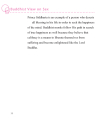self-liberation : ค้นหาหนังสือธรรมะ
หน้าหนังสือทั้งหมด

78
The Teachings of the Buddha
…uddhism encourages self-reliance, self-development and conduct of high moral standards that lead to self-liberation. Buddhists embrace the practice of moral restraint (sila), mindfulness (samadhi), and wisdom (panna…
The Teachings of the Buddha, known as Dhamma, emphasize the Middle Way, avoiding extremes of indulgence and self-mortification. Central to Buddha's teachings are the Four Noble Truths, which acknowled

76
The Journey of Siddhartha: From Suffering to Enlightenment
The arrangement miscarried, however, for on the first three visits that Siddhatha made to the village he saw things that had a deeply traumatic effect on his over-protected consciousness. He was initi
This text traces the transformative journey of Prince Siddhartha in his quest for understanding suffering and achieving enlightenment. Over the course of several visits to the village, he encounters t

14
Building a Trustworthy Family
involvement with this distrustful person. Good people will not
want to befriend dishonest people because they do not want to
gain a bad reputation through association.
So if a person in a family does
The text emphasizes that honesty and self-control are essential for a trustworthy family environment. Good people avoid associations with dishonesty. A family lacking truthfulness cultivates suspicion

14
Building Strong Family Foundations Through Truthfulness and Self-Control
involvement with this distrustful person. Good people will not want to befriend dishonest people because they do not want to gain a bad reputation through association.
So if a person in a family does
This text discusses the importance of truthfulness (sacca) and self-control (dama) in family dynamics and personal growth. It emphasizes that individuals with a lack of truthfulness can create distrus

62
Understanding Buddhist Concepts: Key Terms and Definitions
phenomena; outside the sphere of natural law; supernatural (unexplainable phenomena)
อดิษฐาน past life; previous life; previous existence
อทินนนทาน taking what is not given; stealing
อทุกขมสุข neither
This text presents key Buddhist concepts such as 'อนัตตา' (non-self), emphasizing that there is no lasting essence, only the illusion of self that causes attachment. It discusses 'อนิจจตา' (impermanen

165
Exploring Concepts in Buddhism and Mindfulness
Sanskrit: another ancient language used in India; Buddhist scriptures in Sanskrit are translated from the Pali language; Sanskrit texts are used by the Mahayana school of Buddhism.
Seventh Base of th
This text delves into the significance of Sanskrit as an ancient language in India and its relation to Buddhist texts, particularly those influenced by the Mahayana school. It introduces the Seventh B

15
Self-Training and Endurance in Family Life
Those who have full knowledge, ability and goodness
must follow only this path in order to train themselves to keep
up with the world and its people, and not surrender to
defilements.
Surely, if you f
This text emphasizes the significance of self-training and self-control in leading a fulfilling life. By acknowledging the need to change negative habits, individuals can foster a healthier family env

25
The Four Problems in Marriage
Part One: Family Life
These are: Truthfulness (Sacca), Self-Control (Dama),
Endurance (Khanti), and Sacrifice (Caga). When lacking in
any of these principles, conflict or discord will arise in any
hum
Part One: Family Life highlights four essential principles for maintaining healthy relationships: Truthfulness (Sacca), Self-Control (Dama), Endurance (Khanti), and Sacrifice (Caga). Conflict within f

184
Glossary of Key Concepts in Buddhist Philosophy
Part Seven: Appendixes
Glossary
Anattata: Non-self; nothing in the world has implicit
identity
"There is nothing out there, not even our bodies, which
we can control. Thus, it is not distinctly ours.
This glossary provides definitions for key Buddhist concepts such as Anattata (non-self), Aniccata (impermanence), and Bhavana (meditation). It emphasizes the understanding that nothing possesses a pe

142
Self-Responsibility and Social Development in Buddhism
Suzanne Jeffrey
And that’s where we close the circle. We do it for ourselves because we have to develop ourselves before we can develop anything else … but everything about us affects all of the peop
The text discusses the necessity of self-development before aiding others, emphasizing self-responsibility post-birth. It highlights the crisis of independence and the importance of moral boundaries i

36
Buddhist View on Sex
Buddhist View on Sex
Prince Siddharta is an example of a person who deserts
all blessing in his life in order to seek the happiness
of the mind. Buddhist monks follow His path in search
of true happin
Prince Siddharta represents a figure who renounces worldly pleasures to pursue mental happiness. Buddhist monks emulate his journey, viewing celibacy as a key to liberation from suffering and a path t

156
A Journey's Preparation: Truth for the Family
Part Five: Truth for the Family
Chapter 28
A Journey's Preparation
The man whom we call the Buddha was able to conquer
all sufferings. He taught that we can cope with unexpected
suffering by mindfully
In this chapter, the author discusses how the Buddha was able to overcome suffering and teaches us the importance of preparing ourselves for life's challenges, such as aging, sickness, and death. Key

84
The Wisdom of Dhammakaya
6.The
The Wisdom of Dhammakaya [vijja dhammakaya] is the insightful
knowledge of the reality of life and the world that can be attained
through deep meditation.
7.Collective state of enlightenment whe
The Wisdom of Dhammakaya, described as vijja dhammakaya, represents deep, insightful knowledge attained through meditation, facilitating liberation from samsara. Key figures include the Great Master P

5
การวิเคราะห์วิถีทางพระพุทธศาสนา
164
ธรรมาธรรม
วิเคราะห์วิถีทางพระพุทธศาสนา ปีที่ 6 ฉบับที่ 1 (ฉบับรวมที่ 10) ปี 2563
Mahāyāna Buddhism:
Reasons for Diversity in the Buddha’s Teachings
SASAKI Shizuka
Abstract
Buddhism in the peri
บทความนี้วิเคราะห์ความแตกต่างของแนวคิดในพระพุทธศาสนา โดยมุ่งเน้นที่พระพุทธศาสนามหายานที่มีความคิดชนิดหนึ่งที่ต่างออกไปจากคำสอนของพระโสดาบัน โดยอ้างอิงถึงเหตุการณ์ในสมัยพระเจ้าอโศก ซึ่งเป็นช่วงเวลาที่เ

70
Understanding Buddhism: A Cosmic Religion
… disbelieve until something is
proven to be true or false.
Buddhism encourages self-reliance and self-liberation through good deeds.
Although Buddhism is one of the world’s oldest religions, its principles and t…
Buddhism, founded by the Buddha over 2,500 years ago, emphasizes freedom from suffering and is based on logical, practical principles. This religion transcends blind faith and superstitions, making it

77
Addressing Family Issues for Child Development
Part Three: Problems Within the Family
towards their happiness, spoiling our children neglects their
important emotional and spiritual growth. Spoiled children
usually end up more unhappy in the long-
Part three discusses the critical issues faced within families when children are spoiled, leading to unhappiness and self-destructive behaviors. It emphasizes the role of parents as teachers in guidin

46
Journey to Joy
Journey to Joy
46
46
universal love, the love of all of humankind
without expectation of reward or gain.
To love ourselves in the appropriate way,
we have to still the mind by relaxing and gently
clos
In this chapter, the focus is on cultivating universal love and self-love without expectations. By relaxing the mind through meditation, individuals can achieve inner peace and a sense of cleansing th

24
Dhamma for Laypersons and the Four Levels of Beauty
A person who has the Dhamma for Laypersons
(Gharāvās-dhamma) must display four regular habits:
1. Habit of Responsibility – Whatever the task at hand, he must do it to the best of his ability, in t
A person who follows the Dhamma for Laypersons exhibits four habits: responsibility, self-training, endurance, and sacrifice. These traits ensure self-reliance and leadership within families. In marri

53
Self-Development and Teacher Training Initiatives
Meeting #8
January 03, 2010
Today I am here with Luang Pi Joshua and Luang Pi Anurak. I have just returned to Bangkok and the Wat, after spending the end of 2009 in New York, helping my daughter move
In this meeting, various educational initiatives are discussed, focusing on self-development programs and teacher training. Projects include a Self-Development program inspired by the Five Rooms and S

120
Seeking Guidance from a Dharma Adviser
Needing with a Dharma Adviser
The Unknown Factor
-------------------------------
It Must Exist Because of Balance:
If There Is Suffering, Fear,
And Ignorance, There Must
Be Something That Can Fix It
The text delves into the concept of seeking a Dharma adviser to help navigate the unknown factors of suffering, fear, and ignorance. It discusses that if there is suffering, there must be a solution,
